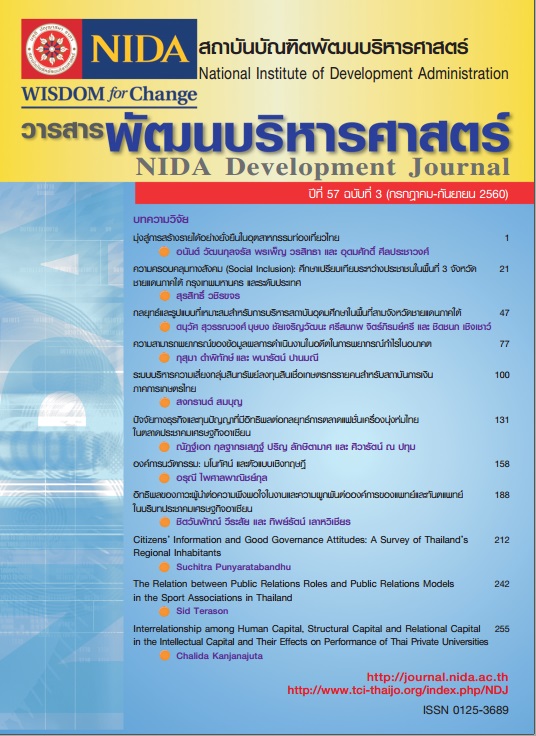ความครอบคลุมทางสังคม (Social Inclusion): ศึกษาเปรียบเทียบระหว่างประชาชนในพื้นที่ 3 จังหวัดชายแดนภาคใต้ กรุงเทพมหานคร และระดับประเทศ
Keywords:
ความครอบคลุมทางสังคม, คุณภาพสังคม, จังหวัดชายแดนภาคใต้, กรุงเทพมหานคร, Social Inclusion, Social Quality, Southern Border Provinces, Bangkok MetropolitanAbstract
Social Inclusion: A Comparative Study between People in Three Southern Border Provinces, Bangkok Metropolitan, and National Level
Abstract
The study of “Social Inclusion: A Comparative Study between People in Three Southern Border Provinces, Bangkok Metropolitan, and National Level,” was aimed at; (1) to study social inclusion’s overall situation of the people in three southern border provinces, Bangkok Metropolitan, and national level, (2) to compare the results between social inclusion of the people in three southern border provinces, Bangkok Metropolitan, and national level. The social inclusion indicator questionnaire which based on the concept of social quality was employed to obtained the data from the samples with 18 years of age and above in the three southern border provinces with the total number of 978, the Bangkok Metropolitan with the total number of 1,000, and overall nation with the total number of 1,200. The results of the analyses when comparing to the national level revealed significant difference between the social inclusion in three southern border provinces, Bangkok Metropolitan, and national level in all aspects. The people in three southern border provinces had the lowest level in last election voting rate, and they had more discrimination experience in term of age, sex, nationality, and education. On the contrary, people in Bangkok Metropolitan had more discrimination experience in term of social status and physical look. Beside, the study showed that people in Bangkok Metropolitan had negative opinion towards giving the chances for an immigrant to become a political leader and a CEO of a Thai company. They also disagreed with the statements that “On the whole, men make better political leaders than women do,” “A university education is more important for a boy than for a girl,” and “On the whole, men make better business executives than women do”.





